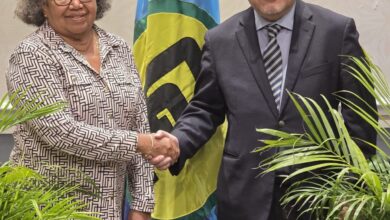(CARICOM Secretariat, Turkeyen, Greater Georgetown, Guyana) Deeper levels of functional cooperation in tourism, re-branding of the Region’s tourism product to reflect its diversity, and Transportation, will be prime areas of focus when Heads of Government of the Caribbean Community (CARICOM) meet in a special session devoted to Tourism during the Twenty-Ninth Meeting of the Conference of Heads of Government in Antigua and Barbuda, 1-4 July 2008.
The Meeting opens at the Sandals Grande Antigua Resort and Spa on the evening of 1 July and the all-day first session on 2 July at the Jolly Beach Resort and Spa will focus on tourism. It was agreed also that Tourism would become a permanent item on the Agenda of the Conference of Heads of Government.
The decision for the special session was taken at the Nineteenth Inter-Sessional Meeting of the Conference of Heads of Government held in Nassau, the Bahamas in March, and followed a call by the host Prime Minister, the Rt. Hon, Hubert Ingraham for a more focused and intensified approach to tourism in the Region. Prime Minister Ingraham is the Lead Head of Government with responsibility for tourism in the Community’s Quasi-Cabinet.
At a Media Clinic hosted on Friday 27 June 2008 by H.E. Edwin Carrington, Secretary-General of CARICOM, the Hon. Harold Lovell, Minister of Tourism, Civil Aviation, Culture and Environment, Antigua and Barbuda, and Senator Allen Chastenet, Minister of Tourism and Civil and Aviation, Saint Lucia, spoke of the tourism industry’s concerns and the issues that would be addressed at the Meeting.
According to Minister Lovell, the industry was at an interesting period when its performance, challenges and opportunities were taken into consideration. Member States, he said, must seriously engage each other, consolidate existing markets and capitalize on emerging markets. The industry, he said, must also look at cross-sectoral linkages.
Minister Chastenet pointed out that destination branding, a regional marketing campaign, taxes in the industry, transportation, and the pursuit of sustainable economic tourism, were among the issues that would be presented to the Heads of Government.
Responding to questions about a single regional air carrier, the Ministers noted that while it was an ideal to which the Region aspired, it was not achievable in the short term. What was needed, they pointed out, was deeper functional cooperation, greater collaboration, coordination of routes and hubs, and a better understanding of transportation networks.





